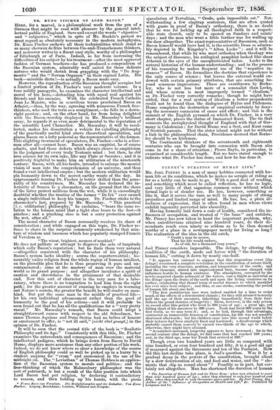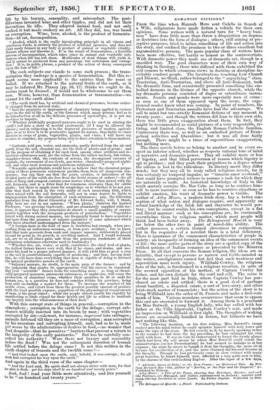PINNEY'S DURATION OF HUMAN LIFE. * Ma. JOEL PENNEY is a
man of many hobbies connected with hu- man life or its conditions, which he makes no scruple of riding as far as a hobby can be made to go. With a good deal of reading, and something which must be called reflection, he has no logic, and very little of that sagacious common sense without which formal logic is of slender use. He has, however, something so like it, that it serves the turn as well to many people of strong prejudices and limited range of mind. He has, too, a plain di- rectness of expression, that is often found in men whose views exhibit ingenuity perverted into absurdity. Having formerly laid down a code of health, considered the in, fluences of occupation, and treated of "the bane" and antidote, Mr. Pinney has now taken in hand the important problem why, when antediluvians attained nine hundred years, do their de- scendants reach even ninety so seldom as to be then deemed worthy of a place in a newspapaper merely for living so long ? The realization of the idea in the old catch, " Could a man be secure That his life would endure,
As of old, for a thousand years,"
Joel Pinney considers impossible. The deluge, by altering the condition of the earth, made sad havoc with " the duration of human life," cutting it down by nearly one-half.
" It appears but rational to suppose that this stupendous event [the deluge] occasioned a complete revolution in the constitution of nature itself including the very structure, position, and temperature of the earth; and that the elements, stirred into unprecedented fury, became charged with influences hostile to human existence. The atmosphere, corrupted by the newly-acquired chaotic sediment of the waters, cast a blight as universal as the deluge upon the fruits of the earth and upon the living creatures on its surface, originating that dismal troop of mortal diseases to which, mankind has ever since been subject ,• and thus, at one stroke, contracting the period of human life about one-half.
" The first postdiluvian race were indeed enabled for a time to resist much of the effects of a deteriorated climate ; for they still attained to nearly half the age of their ancestors, inheriting immediately. from their fore- fathers the grand stamina of longevity ; Shem, however, is the only person on record after this period who lived to 600 years of age ; a great age, yet falling short of his ancestors by 300 years. Noah had lived 600 years in the first world, as we may term it ; and, as he had, through this advantage, contracted an immoveable firmness of constitution, his life was not sensibly shortened afterwards ; but his children came into this second world before their natures had been similarly fixed and hardened ; a disadvantage which probably caused them scarcely to exceed two-thirds of the age to which, otherwise, they might have attained.
"As numbers increased, longevity appears to have decreased ; for in the second century after the deluge, we find none that had reached 240 years ; and, in the third age, none but Terah that arrived at 200."
Though even two hundred years are little as compared with nine hundred, or even four hundred and fifty, it is a good. old age
if measured against the threescore and ten of Psalmist. How did this last decline take place, is Joel's ceestion. Was it by a gradual decay in the powers of the constitution, brought about by a slow deterioration of air, and food and. water, and. the " ele- ments that clip us. round aCout " ? Possibly so in part, but cer- tainly not altogether. Man has shortened the duration of human • The Duration of Human Life and its Three Eras: when men attained to more than nine hundred years of age ; when they attained to only four hundred and ,fifty; when they reached to only threescore years and ten. By Joel Pinney, Esq., Author of the "Influence of Occupation on Health and Life," ¢c. Published by Longman and Co. life by his luxury, sensuality, and misconduct. The post- diluvians invented wine and other tipples, and did not let their inventions lie idle. They adopted animal food, and not only cooked it but made cookery an art. All they did, too, was based on corruption. Wine, beer, alcohol, is the product of fermenta- tion—id est, decomposition.
"Alcohol, which is the really intoxicating. principle in all vinous and qdrituous fluids, is entirely the product of artificial agencies, and does not exist ready formed in any body or product of animal or vegetable vitality. Nature abhors and disowns it. It is the result of fermentation ; a horrible process of decomposition, which takes place in animal and vegetable sub- stances when life has left them. Multitudes of dead things will yield it, and it cannot be produced from any parentage but rottenness and corrup- tion! It is, in polite phrase, a product of the action of decay consequent upon the loss of life."
The cook subjects our viands to some such process ; the trans- mutation they undergo is a species of fermentation. But this re- mark seems more applicable to the entrées than the roast or boiled. If we returned to the natural fruits of the earth, as it may be inferred. Mr. Pinney (pp. 16, 17) thinks we ought to do, acorns must be dressed ; it would not be wholesome to eat them raw. Worse, however, than fermentation or transmutation—we cannot let the earth alone I
"The earth itself has, by artificial and chemical processes, become entire- ly changed from its natural state. "Into the propriety or impropriety of chemistry being applied in various ways to the soil of the earth, or the distrust which many persons feel as to its introduction at all in the delicate processes of agriculture, it is not my province to inquire. " Whether artificially prepared manures ought to be used in stirring the earth's soil into a state of morbid excitement, (if I may be allowed the phrase,) and in subjecting it to the depraved processes of modern agricul- ture, so as to force it to be productive against its nature, thus liable to cause diseases in crops of grain, vegetables, plants, and vines, I will leave my readers to consider, my purpose being only to draw attention to these matters • " Carbonic acid gas water, and ammonia, partly derived from the air and partly from the soil, chemists say, are the food of plants and of grain ; and for the purpose of obtaining it for such food, among other artificial and de- leterious substances used, are the refuse from the tallow-melters, fish refuse, slaughter-house offal, the contents of sewers, the decomposed carcases of animals, the excrement of sea-fowls, gas-water, chemically-prepared night- soil, and other most noxious and poisonous substances. * * *
"Scientific agriculturists would have us believe that the chemical prepa- ration of these poisonous substances purifies them from all dangerous ten- dencies; but can they say that the pores, cavities, or interstices of the divided parts of the earth are free from the foetid steams of ordure ?—for all sorts of dung and compost contain some matter which, when mixed with the soil, ferments, and is a fitter food for venomous creatures than for edible plants : but there is ample room for misgivings as to whether it be not pos- sible that food reared in the very midst of such nauseating filth, which when mixed with the soil ferments, will not in some degree be liable to impregnation from the absorption Of such substances ; nay, the 'following quotation from the _Rural Ohentistry of Mr. Edward Belly, will, I think, fully bear me out in my opinion. When plants,' observes the learned Professor, 'are growing vigorously, and are abundantly supplied with ma- nure, it appears that they sometimes do absorb a small quantity of organic
i matter together with the inorganic products of putrefaction.' Vegetables forced with strong animal manure, are frequently found to have acquired a bad taste from the presence of minute quantities of some substance which they have absorbed undeeomposed from the manure.' 'A foreign taste in the food of man is doubtless bad enough, when pro- ceeding from an unforeseen occasion, or from pure accident but to know that that taste proceeds from rank and impure manure, deliberately placed around its germ in its growth, is revolting indeed. And I would seriously ask, are we at all times quite safe from the poisonous tendencies of these deleterious substances otherwise used in husbandry ? "Whether fire, air, water, or earth, constitutes the chief food of plants, the dullest farmer knows very well, that if he clears, and drains, and ma- nures his land in a proper natural manner, it will yield him as good a crop as the soil. is constitutionally capable of producing ; and that, having done this. he will have done everything that man is capable of doing to forward the natural productive powers of the earth.
"Salutary manure, no doubt, is the main prop of the farmer ; and by the judgment that guides its appropriation will his success be regulated. But your ' scientific farmer looks for something more : so long as chemi- cally-prepared manures, putrescent substances, or aught else, will cause the production of abundant crops, whether their qualities be fit or unfit for human use, is a question he does not consider within his province, being bent only on finding a market for them. To increase the number of his arable acres, and extort from them the greatest possible amount of produce with the least possible expense, regardless of the physiological requirements Of man, is his great object ; while the people almost justify his cupidity by manifesting so little regard for their health and life as seldom to institute any inquiry into the wholesomeness of their food."
With this corrupt state of things in general,—corruption in the atmosphere ; corruption on the earth by the deluge ; corrupt sub- stances wilfully inserted into its bosom by man ; with vegetables corrupted by art--colewort, for instance,. Improved into cabbages ; animals fattened till they are a mass of corruption ; man corrupted by his ancestors and corrupting himself, and. bad as he is, made yet worse by the adulterations of dealers in food,—no wonder that Joel despairs—that he perceives " barriers that prevent a return to the longevity of the early_ patriarchs." But has he carefully con- sulted his authority ? Were there not luxury and sensuality before the flood ? Was not the subsequent duration of human life settled before the deluge came ? Is not this written in the sixth chapter of Genesis and the twelfth verse ?— " And God looked upon the earth, and, behold, it was corrupt ; for all flesh had corrupted his way upon the earth." And again in the third verse of the same chapter— "And the Lord said, My spirit shall not always strive with man, for that he also is flesh : yet his days shall be an hundred and twenty years."
Joel, Joel T. read your Bible more attentively, and live yourself to be " an hundred and twenty years."



























 Previous page
Previous page